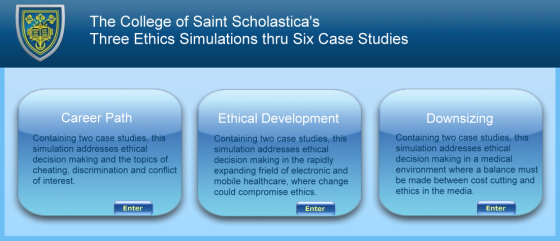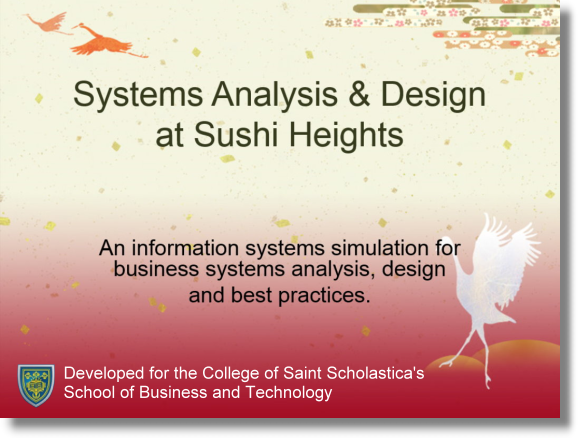Current Projects
Ethics Gamification Project
ReviewBased on course surveys, as well as achievement levels of the desired skills, knowledge and values, the student feedback of the updated and revised course is very positive. They noted the ease of access and use of the updated assessment tools such as exams, papers and portfolios, and the students strongly supported more regular future use of serious games and case study simulations as an integral part of the course. More specifically, the students enjoyed working hands-on through the realist ethical dilemmas presented both in class and online, and they especially appreciated the direct and immediate feedback provided from both the instructor, as well as from the simulations and computer based assessment tools. In addition, in the mid-semester and end of the semester reviews, the students cited the following as the five most noteworthy components of the revised course:
- Clearly defined goals and assignments.
- An examination of their personal values in relation to professional, cultural, and social standards for ethical decision making.
- A well structure combination of assigned readings, online videos, and in class lectures that directly related the current and future dilemmas they will face as management professionals.
- The meaning and depth added by serious games and case study simulations.
- Weekly group activities
- these included both online and face-to-face discussions, a formal debate, and guest speakers.
FIORD App Project:
A Framework App for Ethical Decision Making
One of our current projects is the development of an interactive ethics app (Android & Apple)
for ethical decision making based on the "FIORD" (or Facts, Issues, Options, Recommendations,
and Decision basis) method, a process developed by Kathy Modin, and has become a standard
in the College of St. Scholastica's School of Business and Technology.
The FIORD Method App is being designed to both aid users in making wise ethical decisions,
and as a training tool, to help students develop a greater sensitivity to ethical issues by
engaging them in critical thinking exercises that reflect what they will face in their future
careers.
 This app asks specific constructive and analytic questions to guide the student through the
ethical aspects of a decision, and help weigh the considerations that will impact the student's
choice for course of action in an ethical dilemma
(see: app flowchart).
The questions will be presented in the following two steps:
This app asks specific constructive and analytic questions to guide the student through the
ethical aspects of a decision, and help weigh the considerations that will impact the student's
choice for course of action in an ethical dilemma
(see: app flowchart).
The questions will be presented in the following two steps:
Step 1: Questions to Frame the Ethical Dilemma
- What is the nature of the ethical "wrong" being alleged in this case?
- Do you agree or disagree that this alleged wrong is in fact a serious moral offense?
- What is your assessment of the soundness of the charge, and what are your recommendations?
Step 2: Analyze the ethical issues by using the following FIORD Method questions:
- Facts - What are the pertinent facts in the case? What is the situation? Who is involved?
- Issues - What are the "ethical" issues? Who will these issues affect?
- Options - What are all the realistic options available? What would be the consequence of each?
- Recommendations - What action would you recommend? How would you implement your plan?
- Decision Basis - What is your decision based on? What ethical theories? What prior case decisions?
Six Case Study Games in Three Ethics Simulations Project

The development of this
Web-based / Flash ethics simulation is the result of a collaborative effort
by faculty, students and administrators from the St. Scholastica departments
of Pyschology, Management, Computer Information Systems and Health Information
Management.
Useful in multiple disciplines, this project presents students with six
unique and separate case studies divided among three general Ethics
Simulations.
Simulation 1: Career Path
Containing two case study games, this simulation addresses ethical decision making by focusing on the topics of cheating, discrimination and conflict of interest.
Simulation 2: Ethical Development
The second deals with changing business policies and procedures. More specifically, this simulation contains two case study
games that address ethical
decision making in the rapidly expanding frield of electronic and mobile healthcare, where changecould compromise ethics.
Simulation 3: Downsizing
The third simulation relates to ethical decision making set in a hospital environment, focusing on
two case study games that revolve around cost cutting, cover up, and ethics in the media.
Information Systems Serious Game / Simulation Project
 This Learning Games project is a multi-user / real-time team online case simulation
/ role-playing game (RPG) that focuses on business information systems design, modeling and analysis.
The students explore the field of business systems analysis through RPG
scenarios in combination with using a queueing theory model and both continuous, as well as discrete-event simulations.
The RPG scenarios focus on real-life systems found in restaurant business performance and
management systems. Students will explore mission critical systems commonly found in the modern, competitive restaurant industry. This simulation is also designed to teach and explore
systems thinking and best practices through operations research modeling methods and solution algorithms in optimization, simulation, scheduling, and related areas.
This Learning Games project is a multi-user / real-time team online case simulation
/ role-playing game (RPG) that focuses on business information systems design, modeling and analysis.
The students explore the field of business systems analysis through RPG
scenarios in combination with using a queueing theory model and both continuous, as well as discrete-event simulations.
The RPG scenarios focus on real-life systems found in restaurant business performance and
management systems. Students will explore mission critical systems commonly found in the modern, competitive restaurant industry. This simulation is also designed to teach and explore
systems thinking and best practices through operations research modeling methods and solution algorithms in optimization, simulation, scheduling, and related areas.
Collaboration during the design and development processes was twofold, on one side meetings, presentations and surveys were held with departments, faculty and staff from the SBT, Psychology, HIM and Sandbulte Center to gain ideas for content and direction in the game development process. On the other side,
a team of students with a variety of backgrounds was assembled to help in the final steps of development, and to review the game content before beta testing.
Below is a partial list of the
College of St. Scholastica students (and their majors) who have worked, and are currently working on this project:
 In addition, a compion text was developed and published, containing written copies of the case studies, related questions,
possible inclass activities and assignments. This companion book, is available online at Amazon.com, and though most major bookstores.
In addition, a compion text was developed and published, containing written copies of the case studies, related questions,
possible inclass activities and assignments. This companion book, is available online at Amazon.com, and though most major bookstores.
Buck, T. (2016). Computer information systems: Select case studies. New York, NY: McGraw-Hill, Higher Education.
ISBN: 978-0-9843779-2-3
Serious Games Resource Library Project
The creation of a library of serious games and simulations that can be
adopted across different curricula. This library will be shared with other
St. Scholastica departments and with peer colleges, to promote broader
cross-curricular impact.
This builds directly on our two most recent grants from The C. Charles
Jackson Foundation. The games to be incorporated into the curriculum are designed to teach and explore the pressing issues of our times through new models for digital education.
The serious games and simulations will be developed and/or adopted for
the library around content suggested collaboratively by St. Scholastica students, faculty, community leaders, and the Sandbulte Center for Ethical Leadership.
From STEM to STEAM: 3D Printing in K-12 Classrooms
Through this interactive hands-on Science, Technology, Engineering, Mathematics & Art project, educators will learn all the steps of how to get started with 3D printing, and bring to life a students’ virtual work as a physical objects.
Interactive and concrete examples of K-12 STEM/STEAM projects, as well as links to curriculum guides and lesson plans, are included in this poject. With the tools and information collected for this project, educators will be able to:
- Describe different types of 3D printers and 3D printing uses
- Teach 3D printing to youth of many ages
- Select affordable hardware, software and supplies that’s the best fit for your classroom and projects
- Use your new skills and resources to share this leading technology with your community
- Comfortably control a 3D printer
- Address common issues and methods for troubleshooting
- Integrate 3D printing into your curriculum in a variety of applications